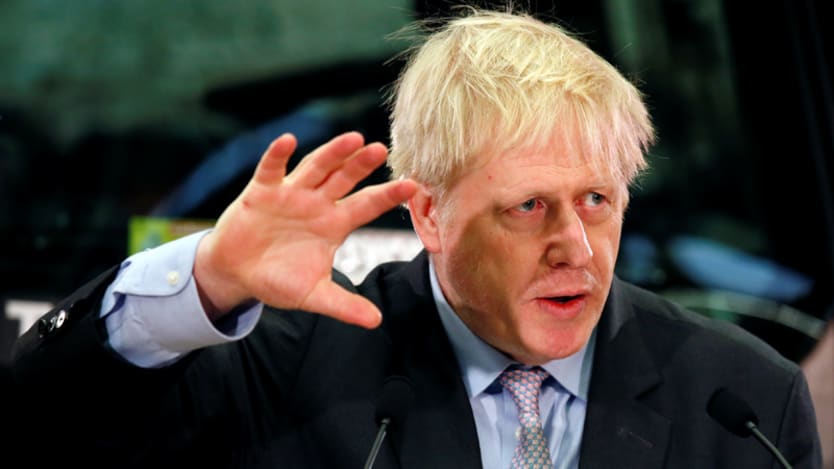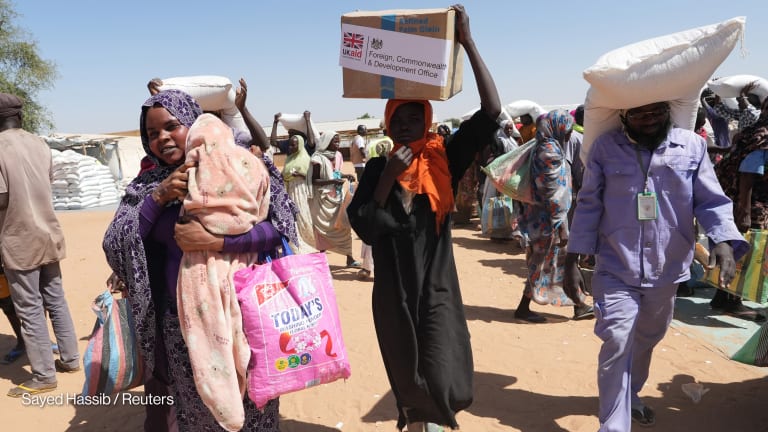
Of the countless casualties piling up on the Brexit funeral pyre, there may be a new one coming with far-reaching consequences beyond British shores: the potential demise of the U.K. Department for International Development.
More on the future of DFID:
► DFID ministers play musical chairs
This foreign aid behemoth controls most British aid — the third largest budget in the world at $18 billion and growing — and has a full seat at both the cabinet table and on the national security council. Its budget, clear mission, investment in research, and assertiveness domestically and internally has made it a “development superpower” in the words of its last leader, Penny Mordaunt, who left to become U.K. defense secretary.
The threat to DFID’s existence and independence comes from Boris Johnson, the arch-Brexiteer and former British foreign secretary and London mayor who is most likely to succeed Theresa May as Britain’s next prime minister.
As foreign secretary, Johnson maneuvered to absorb DFID into the Foreign & Commonwealth Office. Early this year, after leaving the job, he began an outright assault, telling the Financial Times, “if ‘Global Britain’ is going to achieve its full and massive potential then we must bring back DFID to the FCO. We can’t keep spending huge sums of British taxpayers’ money as though we were some independent Scandinavian NGO.”
This play for the robust resources of British foreign aid is not new. The Tories have tended to want to consolidate the power of the foreign aid purse into the foreign office, and Labour to create an independent entity.
As a result, DFID has yo-yoed from being an independent ministry created in 1964 to a wholly-owned subsidiary of FCO several times over. Cleaved from FCO and elevated to a full cabinet department again by former Prime Minister Tony Blair in 1997 as part of the sweep of post-Thatcherite reform, DFID has been a pathbreaker in many respects for the past two decades.
This reputation for leadership and results was influential in both former Prime Minister David Cameron’s choices to not only keep DFID independent but to boost its budget with a legislative requirement to spend 0.7% of gross domestic product on aid. Despite some early doubts, Theresa May has retained that policy during her three years as prime minister.
So why does Johnson want this consolidation? First, money is power, and DFID has a lot more of it than FCO. As Andrew Mitchell, a former Conservative international development secretary said: “Boris is a bit like a medieval pirate whose eyes have alighted on this plump Spanish galleon loaded with bullion and he wants to board it and plunder it.”
As a point of comparison, the U.K.’s defense budget is only 2.5 times larger than the aid budget. The U.S. defense budget is 20 times larger than its aid budget. Several governments have taken the same step in recent years, such as Canada and Australia, with decidedly mixed results.
Second, there is a deeper belief at play — that the interests of FCO and the nation are different from the interests of the poverty-reducing, climate-fighting DFID. And therefore more of the foreign aid should go to shore up serious foreign policy priorities, rather than the nice-to-have support for the poorest achieved by aid.
This thinking is akin to U.S. President Donald Trump’s order to deny aid to countries that vote against the U.S. at the United Nations or to cut support to central American countries whose migrants are showing up in the U.S. For the U.K., it is likely to mean more money to countries that strike new trade deals with post-Brexit Britain.
Third, populist politicians and arch-conservative outlets such as the Daily Mail like to assert that vast amounts of aid are wasted or stolen — with limited factual basis — as if putting it into the hands of diplomats will improve that.
But these rationales are flawed and inimical to Britain’s broader ambitions in troubled times for the U.K. and for the world.
The core lesson of the last few years — with climate crises, pandemics, and mass displacement — must be that so-called “development” problems are actually fundamental national security issues. The ability to deal with extremism, migration, and threats to the global food supply are top priorities on anyone’s list, and foreign assistance will be an absolutely critical tool to addressing them.
If anything, more diplomatic power must be redirected to addressing these problems, rather than winnowing the aid resources.
More on the UK cross-government strategy:
► New index raises concerns about aid quality outside DFID
► UK aid 'brand' at risk from cross-government funds, says IDC report
These are also challenges that require research, evidence, and technical and programmatic capacity. These capabilities have been painstakingly built in DFID, whereas it’s simply not what FCO does well. The U.K.’s aid watchdogs have made this dichotomy clear in a series of reports suggesting that the resources already controlled by FCO were so poorly spent as to put the U.K.’s reputation at risk.
The biggest challenges also require bold and focused leadership. The scale of the U.K. aid budget and the strength of its ministry, allow it to speak more loudly and with greater clarity at important decision-making tables, domestically and internationally. With a seat at the cabinet table, the issues that the development minister focuses on — poverty, gender equality, climate change, defense against pandemics — become cabinet issues, not pushed aside in favor of the other high-profile issues on the foreign minister’s agenda, like Russian encroachment, EU politics, or losing former colonial possessions.
As for how to use taxpayer resources most effectively, Overseas Development Institute research shows evidence that aid is most effective when it is designed and used for the things it can best accomplish.
In other words, aid is good at reducing poverty; supporting inclusive economic growth; supporting public health and family planning; and increasing the capacity of government institutions to deliver for their people and the capacity of civil society to build accountability. It is not good, however, for buying friends to vote for your government at the United Nations, improve the terms of trade, or balancing great power competition.
If Johnson and Britain want influence and results, they will do well to invest their money effectively in things that are critical to planetary stability and survival. That’s what DFID is there for.
Search for articles
Most Read
- 1
- 2
- 3
- 4
- 5








